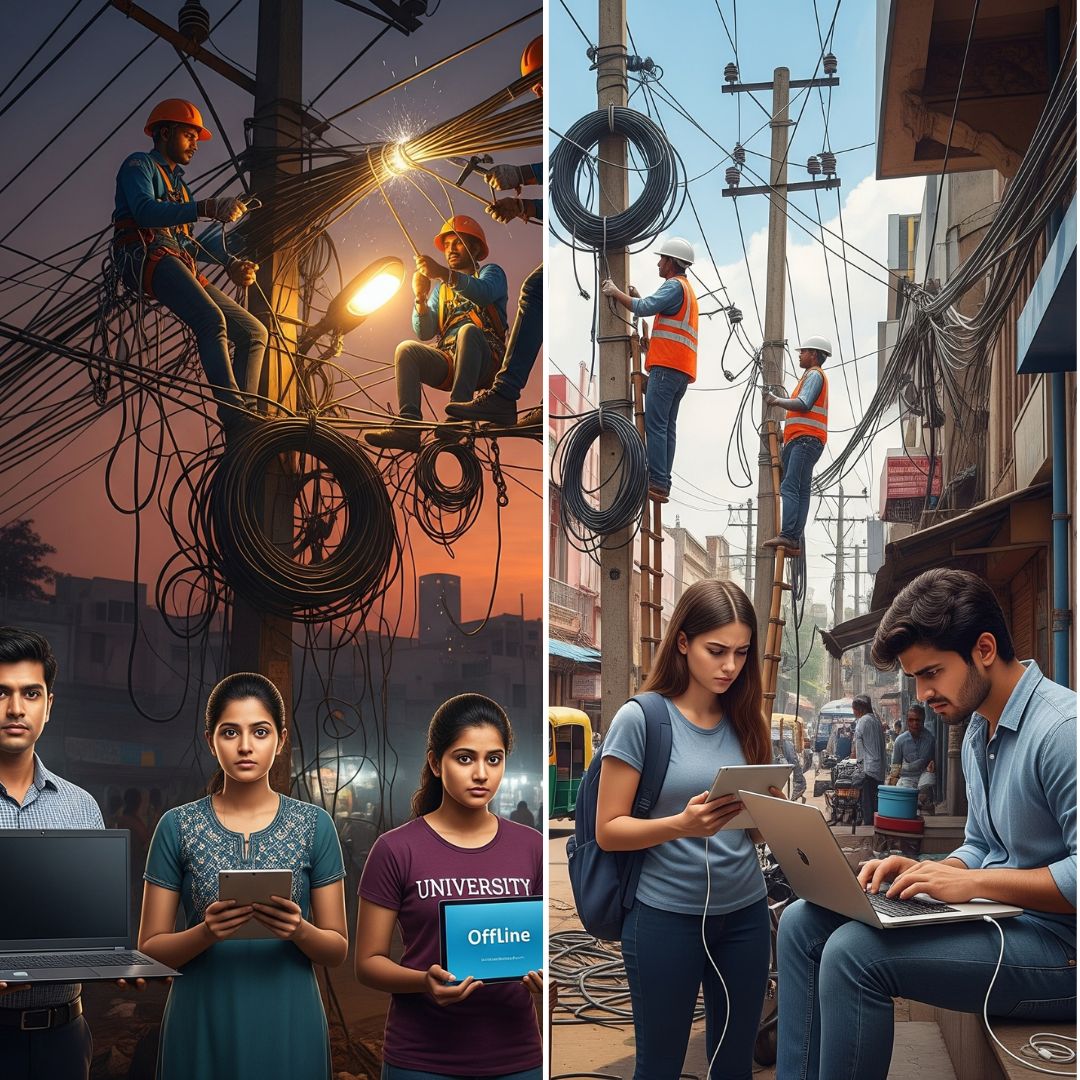Hyderabad is currently grappling with extensive internet and cable TV disruptions as the Telangana State Southern Power Distribution Company Limited (TGSPDCL) accelerates a large-scale operation to remove unsafe, dangling cables from electrical poles.
Triggered by recent fatal electrocution incidents, this initiative aims to eliminate hazardous wires that pose risks to public safety. However, its execution has unintentionally caused severe outages, affecting over 100,000 broadband connections in key localities such as Kompally, Tellapur, and Shaikpet.
The sudden loss of connectivity has deeply impacted residents’ routines, notably those working remotely and students attending online classes. The Cellular Operators Association of India (COAI) has sharply criticised the indiscriminate cutting of optical fibre cables, which do not conduct electricity, urging TGSPDCL to reassess its approach.
Meanwhile, TGSPDCL defended its operation, stating that multiple warnings had been issued prior to the action. Discussions between TGSPDCL, internet service providers, and industry bodies are ongoing, with commitments to accelerate service restoration and plans to adopt underground cabling to avoid similar disruptions going forward.
Cable Removal Drive Sparks Citywide Connectivity Crisis
The TGSPDCL’s decision to aggressively cut cables follows two tragic electrocution deaths during religious processions in Hyderabad, which raised the alarm on the staggering safety risks posed by poorly maintained and dangling electrical wires.
Ordered by Deputy Chief Minister and Energy Minister Bhatti Vikramarka Mallu, the operation has sought to systematically clear cables violating safety norms. Nevertheless, the wide-ranging cable removal inadvertently included critical optical fibre connections belonging to multiple internet service providers, which do not carry electricity but were mistakenly severed.
This has plunged thousands of residents into sudden broadband and cable TV blackouts without any prior formal notification. “Our remote work and classes are completely disrupted, and security cameras have stopped functioning.
It feels like we are cut off from the world,” lamented a resident from Kompally. Internet providers confirmed unprecedented outage levels, with fibre-to-the-home users most affected.
TGSPDCL officials claimed they had issued repeated notices to cable operators over the past year about removing unsafe cables, but urgent action was now imperative to protect public safety.
Industry Backlash and Ripple Effects on Daily Life
The Cellular Operators Association of India (COAI) vocally condemned TGSPDCL’s indiscriminate approach to cutting cables, emphasising that optical fibre networks are insulated and do not conduct electricity, hence should have been excluded from such removal drives.
COAI stated that the reckless handling has crippled internet access, which in today’s digital age is vital for everything from education to commerce. The disruptions have ripple effects, severely hindering digital payment systems and forcing many merchants and customers to revert to cash transactions, causing financial inconveniences and losses.
Social media platforms have seen a surge in residents’ complaints about failed UPI payments, stalled work, and halted virtual classes. The Telangana Internet Service Providers Association (TISPA) has protested the ongoing cable cuts, demanding an immediate halt and collaborative discussions.
TGSPDCL Chairman and Managing Director Musharraf Faruqui is said to be actively engaging with service providers to expedite solutions. Both sides have agreed on transitioning to underground cabling infrastructure as a long-term measure to enhance safety and prevent future outages.
The Logical Indian’s Perspective
The intention behind TGSPDCL’s operation to safeguard citizens against fatal electrocutions is undeniably critical and commendable. However, this crisis starkly illustrates the urgent need for better planning, coordination, and communication in public safety initiatives, especially in densely populated urban centres increasingly reliant on digital infrastructure. The complete lack of prior warning to consumers about impending connectivity losses has inflicted avoidable hardship on daily life, undermining trust in governance and essential services.
The Logical Indian advocates for a measured approach balancing safety and uninterrupted connectivity: regulatory bodies, power companies, and internet providers must collaborate closely to implement sustainable infrastructure solutions such as underground cabling, which protects lives without crippling communication. As cities grow more dependent on the internet for work, education, and financial transactions, how can authorities ensure that safety drives do not become disruptive crises?













